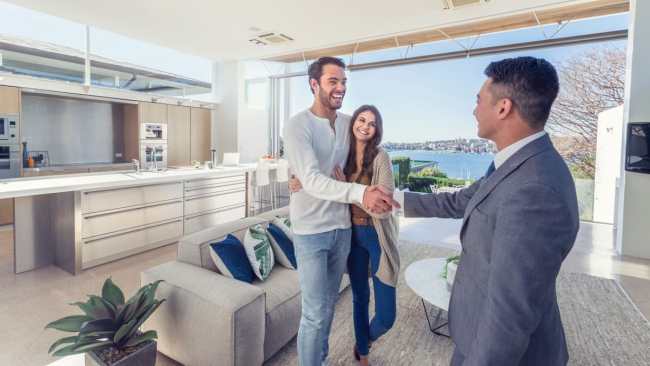How to buy a house: When's the right time to sell your home?
Outgrown your current home? These are the things you need to consider when making that next big decision.

If you feel you’ve outgrown your home and it’s time to upgrade, it can be a tricky process to navigate.
Upgrading can sometimes feel like a juggling act and can be stressful if not managed correctly: Should you sell your existing property first and buy second, or vice versa? Or perhaps you should keep your original property as an investment? Here, the experts share the pros and cons of each approach.
AS A RULE, IT’S GENERALLY ADVISABLE TO SELL FIRST
If you sell first, you have a solid idea of how much money you have to play with when purchasing your new home. Also, as you’re not under pressure to sell, you can also hold out to get the highest possible price for your property.
Real Estate Institute of Australia President Adrian Kelly says “an advantage of selling first means you essentially become a cash buyer, whereas if you try to buy your next home with a direct to sale contract off your existing home, the seller of the property you’re trying to purchase may not find that too appealing.”
The downside of this scenario is the pressure to quickly find a new home to move to. Kelly is seeing an increase in the number of people using a “stop-gap” solution to give them a little breathing room, which allows people to stay with family or rent a property to give themselves time to find their new home.
“This happens a lot in very strong markets,” he explains.
“Even though Melbourne and Sydney have been coming off the boil a bit they are still fairly strong markets … it’s certainly the case where I am down in Tasmania, there’s no way a vendor would even look at a subject to sale contract at the moment because the demand is so high. So yes, I have seen a lot of people staying with family or getting a rental property for six months which gives them time to have a good look around and then when they find something they like, they are in that strong cash buyer position”.
Marketing executive Stacey Gold, 37, is glad she and her husband opted to sell her home in Sydney’s Hills district before upgrading, as the sale of their home took a lot longer than she anticipated.
“We were always of the intention that we wanted to sell first before we even looked anywhere else because we didn’t want to put unnecessary pressure on ourselves financially,” she says.
She is pleased they made this decision as it took two years to get the price they wanted. Luckily, Gold and her husband took advantage of one of the stop-gap solutions Kelly described.
“We bought a place off the plan, and it was a good six months before the development we were moving into was ready,” she says. “We were lucky we could move in with my in-laws for six months … that really took the pressure off”.
DOES IT EVER MAKE SENSE TO BUY FIRST?
The first thing you need to do here is get a good idea of the market - if you’re working in a competitive market and you are sure your property will sell with little fuss then this may be a reasonable route. However, committing to your new purchase without having your present home sold can put pressure on you to accept a much lower offer from a purchaser. If you do purchase first and your home does not sell before a settlement is due, you’ll either have to default on the contract (meaning you will lose your deposit) or take out a bridging loan, which can be expensive and difficult if you don’t have steady cash flow.
Simon Cohen, managing director of Cohen Handler property buyers’ agents usually advises people to sell before they buy, but the reality is it can often take a considerable amount of time to find the right property to upgrade to.
“Sometimes it is about buying that dream property before selling, but you really need to be able to afford to hold it … Or you need to buy something with a long settlement which gives you time to sort out the sale of your own place, so you’re not stuck with two properties,” he says
He warns one of the biggest mistakes he has seen as a buyer’s agent is people falling in love with their new home and making an “emotional” purchase.
“They get emotional and buy a property for top dollar, and then they think they are going to get top dollar for their house and they don’t … and the gap ends up costing them far more than they expected,” he says.
“Having said that, I’ve also on the flip side seen people sell thinking it will be super easy to buy, and they’ve ended up out of the market for one or two years.”
ANOTHER OPTION IS TO KEEP YOUR ORIGINAL PROPERTY AS AN INVESTMENT…
Some people keep their original property and use equity to buy their new home (equity is the difference between the current value of your home and the amount you still owe on your mortgage).
To do this you need to get a professional valuation on your current home, then touch base with your home loan provider to ascertain what you can borrow against your existing property. Note that you not only need to borrow the value of your new property but stamp duty as well - this can catch some people out.
Some lenders will also give you the option of spreading your loan across both properties — this means the tenant in your original home can help you meet the cost of your mortgage repayments through rental income. With a bit of clever structuring, you may be able to cover the entire cost of the loan at your original property.
Alternatively, if the rent doesn’t cover it, you can take advantage of negative gearing (allowing you to offset your loss against your tax bill).
Because you’re now borrowing more money your loan-to-value ratio (LVR) will increase. If your loan-to-value ratio goes above 80 per cent that may mean you need to pay Lenders Mortgage Insurance (LMI) — something to factor into your costs.
Cohen advises holding onto your original home as an investment when the yield (or the rent) equates to it being a good investment.
“Typically more expensive properties are worse yielding properties, so if it was a property that ticked the boxes for tenants and you’d get a good return (a better return than you’d get on the cash) I would hold onto it,” he says.
SO WHEN ALL IS SAID AND DONE, WHAT IS THE ULTIMATE STRATEGY WHEN UPGRADING?
Cohan advises homeowners “really, really do your research and get a good understanding of what your house is worth from a number of different real estate agents, then take 15 per cent off that price as your worst-case scenario.
“Then try and find something, buy it, get a long settlement and then sell knowing you’ve got 15 per cent up your sleeve”.




